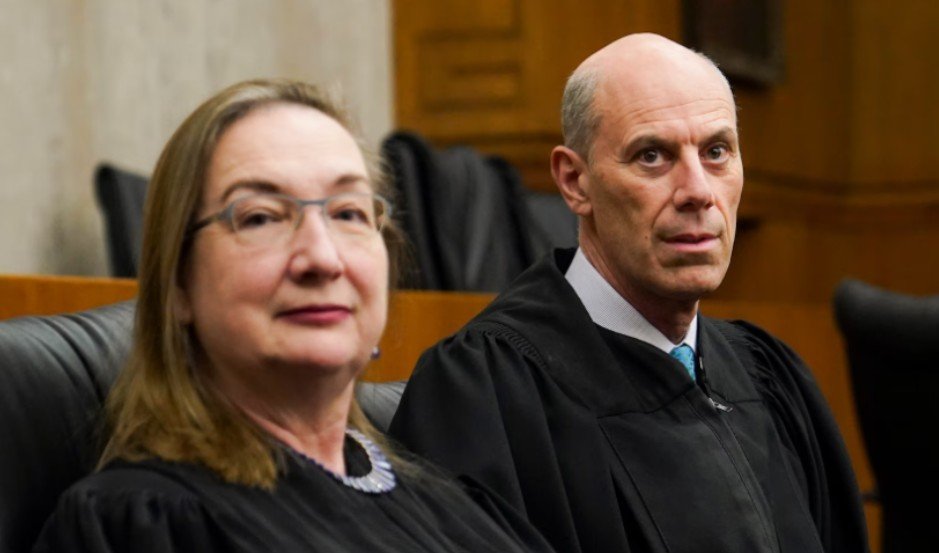
Why, precisely, is a judge in Washington allowed to decide what illegal immigrants with alleged gang affiliations, who were being detained in Texas, are entitled to before they’re deported from the country they’ve unlawfully entered?
That’s what Alexander Hamilton might like to know.
Yes, Hamilton might be the one founding father that it’s OK for Gen Z liberals to like because they can spit verses from “My Shot” on command — likely because the hip social studies teacher in high school let them listen to the “Hamilton” soundtrack for extra credit.
But before he was a rapping puppet for Lin-Manuel Miranda’s take on revolutionary American history, he was actually writing stuff that didn’t involve hip-hop jams with the Marquis de Lafayette. In particular, he was one of the three authors of “The Federalist Papers,” a series of 85 essays that argued in favor of the U.S. Constitution at the time of its ratification.
And, lo and behold, he has something to say about the kind of activist jurists like U.S. District Court Judge James Boasberg, who temporarily blocked the Trump administration from deploying a 1798 law to summarily deport illegal immigrants associated with transnational gangs — in this case, Tren de Aragua, one of the most powerful gangs that’s thrived in the power vacuum created by the dysfunctional Maduro government.
“Given the exigent circumstances that [the court] has been made aware of this morning, it has determined that an immediate Order is warranted to maintain the status quo until a hearing can be set,” Boasberg, an Obama appointee, said in an order March 15, according to Fox News.
Boasberg continued to block any sort of removal under the Alien Enemies Act by challenging the government to prove why each individual being deported is, in fact, an “alien enemy.”
“Before they may be deported, they are entitled to individualized hearings to determine whether the Act applies to them at all,” Boasberg wrote in a Monday ruling, according to the Miami Herald. “Because the named Plaintiffs dispute that they are members of Tren de Aragua, they may not be deported until a court has been able to decide the merits of their challenge.”
It’s unclear what these individualized hearings would look like, as per the Boasberg model, or even whether he’d then acquiesce to the deportations at that point.
In fact, it’s unclear what Boasberg is doing adjudicating this case at all, given that the aliens in question were apparently detained in Raymondsville, Texas — a cool 1,700 miles from the District of Columbia — aside from naked venue-shopping from the American Civil Liberties Union, who (because of course) is representing the Venezuelan migrants. (“You can do all that, you’ve just got to do it in the right court. And the right court was in Texas,” said Judge Justin Walker, another member of the D.C. district court appeals panel, when summarizing the government’s argument against the case.)
The Trump administration has more or less telegraphed its willingness to ignore Boasberg and his ilk to the extent possible and let the Supreme Court be the final arbiter of the mess. Is this some sort of crisis for the rule of law? Not at all, if one were to read Hamilton’s thoughts on the matter.
In Federalist No. 78, one of the most influential documents pertaining to the role of the judiciary in the then-proposed Constitution, Hamilton wrote that the courts “have neither FORCE nor WILL, but merely judgment” and cannot effectuate those judgments on its own.
“Whoever attentively considers the different departments of power must perceive, that, in a government in which they are separated from each other, the judiciary, from the nature of its functions, will always be the least dangerous to the political rights of the Constitution; because it will be least in a capacity to annoy or injure them,” Hamilton wrote.
“The Executive not only dispenses the honors, but holds the sword of the community,” he continued.
“The legislature not only commands the purse, but prescribes the rules by which the duties and rights of every citizen are to be regulated. The judiciary, on the contrary, has no influence over either the sword or the purse; no direction either of the strength or of the wealth of the society; and can take no active resolution whatever.
“It may truly be said to have neither FORCE nor WILL, but merely judgment; and must ultimately depend upon the aid of the executive arm even for the efficacy of its judgments.”
This view, Hamilton said, “suggests several important consequences.
“It proves incontestably, that the judiciary is beyond comparison the weakest of the three departments of power; that it can never attack with success either of the other two; and that all possible care is requisite to enable it to defend itself against their attacks,” he wrote.
“It equally proves, that though individual oppression may now and then proceed from the courts of justice, the general liberty of the people can never be endangered from that quarter; I mean so long as the judiciary remains truly distinct from both the legislature and the Executive.”
Naturally, the argument against this would be that Hamilton was writing to a much different world and audience than these United States in the 21st century.
This isn’t an argument in favor of the anti-Trump forces if one thinks about it too deeply — for example, the fact that Hamilton couldn’t have contemplated a world in which jurists would be asked to decide on whether alleged Venezuelan transnational gang members being flown to El Salvador for detention should be returned to the U.S. for a hearing would reflect poorly not on the lack of foresight Hamilton had but to those who have let America degenerate to such a state in the first place — but these things aren’t thought about too deeply, even at the bench level, which is (alas) the point here.
The Federalist No. 78 clearly and concisely stated the limits that the founders imagined for the judiciary. Anyone who alleges an original intent that goes beyond that is simply fooling themselves — and original intent is what matters. For anti-Trumpers wondering why the administration’s response isn’t a “crisis” of the rule of law by any stretch of the imagination, perhaps try looking into some Hamilton that isn’t “My Shot.”
And no, “It’s Quiet Uptown” doesn’t count, either.
This article appeared originally on The Western Journal.
The post 250 Years Ago Alexander Hamilton Told Us How to Handle These Anti-Trump Judges appeared first on The Gateway Pundit.
Source: The Gateway Pundit
TruthPuke LLC hereby clarifies that the editors, in numerous instances, are not accountable for the origination of news posts. Furthermore, the expression of opinions within exclusives authored by TruthPuke Editors does not automatically reflect the viewpoints or convictions held by TruthPuke Management.







